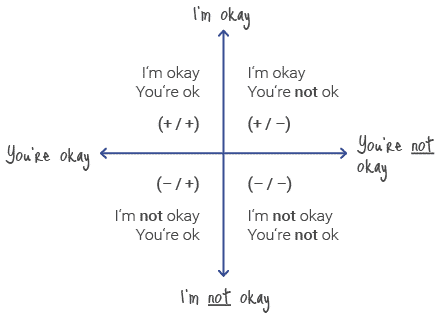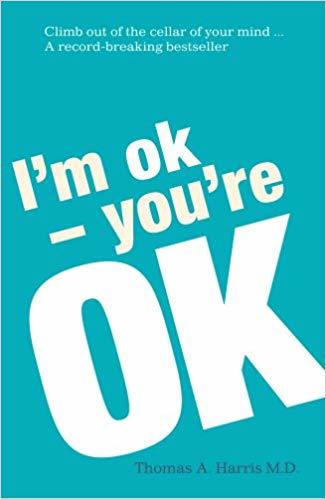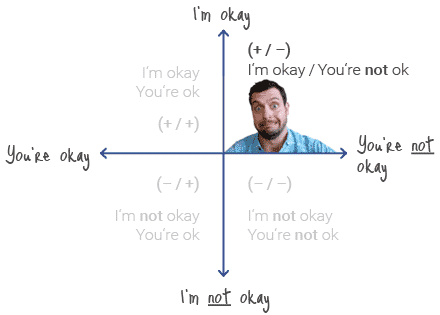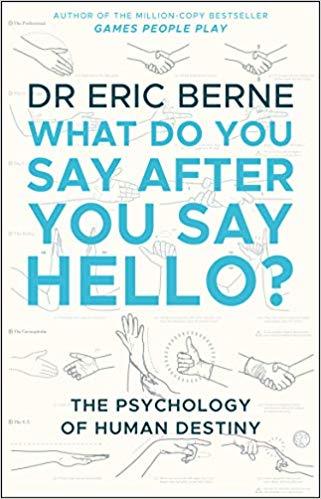I'm Ok, You're Ok - How you develop your attitude
In this article you will learn everything about the topic "I'm ok, you're ok". Behind this simple rule there is an attitude that is often not as simply implemented in everyday life. We'll talk about the following topics:
1. I'm Ok, You're Ok - The Graphic Model (Four Life Positions)
Transactional Analysis - I'm ok, you're ok: Just as there are the schools of thought of psychoanalysis, systemic psychology or behavioral psychology, Transactional Analysis is also a separate field. It is an independent communication theory within psychology. It analyzes communication exchange (so-called transactions). From this, conclusions about the communicating individuals and their personalities can be drawn.
One concept within Transactional Analysis is the life script. This theory analyses the unconsciously written life plan that every human being builds in his childhood.
A sub-concept of the life script are the so-called life positions or ok- positions. They describe how people experience themselves and others and consist of four positions. Look at this picture:

This graphic describes two things:
- Each person chooses one of the four positions as a toddler as a basic disposition and will most likely keep it for a lifetime.
- People also occupy different positions in different situations.
To 1.: Humans create a picture in their heads of themselves, of others and of the world as a whole at a very young age. They need this to be able to orient themselves. For without this basic assessment, lived situations could not be interpreted and thus become experiences. The person would be disoriented - like a leaf in the wind. Unfortunately, many of us don't only have good experiences in their childhood. That's why it may happen that people choose and believe in other life positions than "I'm ok, you're ok".
To 2.: It depends on the situation, which position people occupy. For example, a single person could take these positions in different scenarios:
- Their birthday party (+/-)
- While watching football to scold the opposing team or to talk badly about common friends (+/-)
- When attending a beginner dance class and the others seem to be able to do much better (- / +)
- After a quarrel with their partner (- / -)
However, the own favorite life position remains, which runs like a golden thread through life. But there are also ways to change this. In the example later you will see what I mean.
ENHANCE YOUR COMMUNICATION SKILLS
FREE Compact Course

- Communicate successfully in your professional life
- Enhance conflict management skills
- Understand others better
Learn Transactional Analysis with the Compact Course. Emails, Videos, PDF-Exercises.
No Spam. Unsubscribe at any time.
2. People Are Good - An Attitude Suitable for Everyday Life
When you start to deal with Transactional Analysis, you will also find its basic assumptions. One is: people are good. I always feel this sounds pretty trivial. However, the implementation of this simple basic assumption is anything but simple.
Especially in everyday expression, it can be very demanding to consider this attitude continuously.
Humans are good, meaning that every human being is ok from birth. There is nothing to shake. The "being good" stems from the fact that we were born as living beings.
It's about the value of the individual - not about their behavior. The behavior can also be wrong. Transactional Analysis strictly separates between person and behavior. The person is ALWAYS ok, the behavior can also be not ok.
- “I like you” - this can be an expression of: I'm ok, you're ok.
- “I can't stand you” - this reflects the position: I'm ok, you're not ok.
3. I'm ok - you're ok - The Book of Harris
In 1967, Thomas Anthony Harris published the book titled I'm ok - you're ok. The title was borrowed from the Ok-positions and reflects a fundamental position of the Transactional Analysis. In fact, the book is an introduction to Transactional Analysis.

The work is still popular, but in terms of actuality is a bit outdated. For example, homosexuality is still described as pathological. A lot of times, extreme situations are used to explain certain concepts. Often, this is not suitable for beginners for everyday use.
The book discusses basic concepts of Transactional Analysis, such as ego states and transactions. Since the book is now 40 years old and the Transactional Analysis is constantly being further developed, up-to-date literature is more appropriate. Quite recent (2016): "Into TA: A Comprehensive Textbook on Transactional Analysis" by William F. Cornell.

Or go into deep immediately with the online course and videos and directly get your first certification in Transactional Analysis with the basic course Transactional Analysis.
4. Example for Ok-Positions
Here's an experience from how I use the Ok-positions in everyday life:
Yesterday again ...
My midday nap is over. I drive back to work and find a parking space for my scooter. I walk the last few meters to the office. I see a man coming out of a shop and walking down the same street as I ten meters in front of me. I will never speak to him. He happens to be there. The situation is completely meaningless. If it wasn't for the life script.
Let's rewind for a few seconds.
When I first see the man as he leaves the store, the thought comes to me:
"I'm cooler than him!"
I stop and ask myself, "What was that?"
How do I manage to judge a stranger who just comes out of a shop? He is not even conspicuously dressed.
I realize that I have just made a first judgement about a person. And not a good one.
Transactional Analysis knows these so-called ok-positions:
- I'm ok, you're ok (+/+)
- I'm ok, you're not ok (+/-)
- I'm not ok, you're (-/+)
- I'm not ok, you're not ok (-/-)
Every person has a basic or default disposition of these four orientations. It is shaped very early in life. You can already imagine which one is mine:
I'm ok. You're not ok.

In the situation described above, this disposition apparently has no effect. It seems so. However, it does have one. Namely, it gave me permission to feel cool and superior. These aren't good conditions to interact in unison and harmony with your environment. Imagine I hadn't realized what I was doing.
Maybe I would have entered the office in an arrogant manner. Others could have perceived me as arrogant. Too right.
Someone with a "I'm not ok, you're ok" disposition might have thought, "Wow, he's a lot cooler than me," and might have given himself a reason to feel bad.
My first thought about the man was an automated one. This means that I might often think similarly without even noticing. In fact, that is sometimes the case. Thoughts like this have the power to create a certain destiny. Which brings us to the topic of life script:
Imagine I would have had a conversation with the man. Our very first exchange would have already been clouded by my initial thoughts. Eric Berne also addresses this dynamic with his book title: "What do you say after you say hello".

Thoughts are the building material of your life script. If you already make changes at this level, you immediately change your life script.
Now I have bad and good news for you. First the bad one...
You already have a pre-disposition. For many people this is:
- "I'm ok, you're not ok" (+/-) or
- "I'm not ok, you're ok" (-/+).
- Only few people have (-/-).
By the way, these attitudes change situationally, as already mentioned. However, a basic disposition remains and is not so easily changed.
5. Exercise to Ok-ness
Hey hey, no reason to be frustrated, if you're not naturally having an I'm ok, you're ok disposition. I don't have it either. There are possibilities.
We make us of the Transactional Analysis change principle:
- Analysis
- Redecision
How to do this, I have prepared an exercise here. Just download and let's go.
FREE: Sign up for the e-letter Transactional Analysis and receive the exercise "I'm ok, you're ok" in your first email (you can cancel any time)!!!
ENHANCE YOUR COMMUNICATION SKILLS
FREE Compact Course

- Communicate successfully in your professional life
- Enhance conflict management skills
- Understand others better
Learn Transactional Analysis with the Compact Course. Emails, Videos, PDF-Exercises.
No Spam. Unsubscribe at any time.
These were the essentials about the topic I'm ok, You're ok. If you have questions or want to share your story, you can do so here in the comments. I always answer personally.

